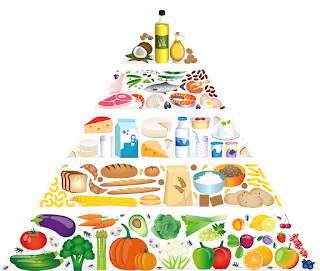 |
| Food Pyramid |
• Proteins
• Proteins are chemicals found in all living things. They are composed of long strings of a small number of different amino acids.
Different proteins have unique arrangements of these amino acids.
• Amino acids are either nonessential or essential.
Nonessential amino acids can be manufactured by cells in the body; essential
amino acids can not be manufactured, and must be acquired through the diet.
• Proteins have many functions in living things. They
build and repair most cell and body structures. They regulate the processes
that produce various chemicals in cells. They also transport the products to other
places within the body.
• Protein in the diet may be from animal or plant
sources. Animal-derived proteins, such as meat, milk, or eggs are reliable
sources of all the amino acids necessary to sustain life. Individual plant
sources of protein do not always contain all the necessary amino acids. Plant
protein sources are often paired in order to provide all necessary amino acids.
For example, beans and rice are a common combination.
• If you eat more protein than your body needs the
excess can be metabolized to provide calories or energy.
• Carbohydrates
• Carbohydrates are simpler molecules than proteins. Their chemical formulas contain only the elements carbon, hydrogen and oxygen. Their chemical names often end in “ose.” Carbohydrates are either simple or complex.
•
Simple carbohydrates are
sugars. They may be found naturally in fruits, honey, and milk. The sugars added
to refined and processed foods are also simple sugars. This form of carbohydrate
is easily absorbed and metabolized for quick energy.
•
Complex carbohydrates are
starches. They are found in grains and products made from grains, potatoes and
other vegetables. Starches can also be used by the body as energy, but must be
digested first. Foods containing complex carbohydrates are often refined,
removing many of the other nutrients such as vitamins, minerals and fiber,
leaving only the carbohydrates.
• Fats
•
Fats may be in a solid or liquid
form. Liquid fats are called oils. Fats from animals include fat in meat and
fish, poultry, and dairy products. Fats from plants are found in nuts, avocados, and olives.
•
Fats contain lots of calories and are an important source of energy in the body. Some vitamins require the
presence of fats to be absorbed from the digestive system.
• Vitamins
•
Vitamins are organic compounds
required in very small amounts for body processes. Different vitamins have
letter names—A, B complex, C, D, E, and K.
•
Vitamins help your body use the
three main nutrients (carbohydrates, fats, and proteins). They are also ingredients
in the production of blood cells, hormones, genetic material, and nervous system
messaging chemicals. Vitamin deficiencies cause diseases such as scurvy and
rickets.
•
Processing many foods removes
nutrients such as vitamins. Enriched or fortified foods had added vitamins to
replace those lost during processing. However, fresh natural foods contain
vitamins in their preferred natural state.
• Minerals
•
Minerals are elements found in
soil that are nonorganic and can not be synthesized by living organisms. They
perform a variety of functions in the body.
•
Calcium, phosphorous and
magnesium form part of bones and teeth. Sodium, chlorine (as chloride) and
potassium regulate the balance of water and other chemicals in the body; they
are known as electrolytes.
•
Some minerals such as copper,
fluoride, iodine, iron, manganese, selenium and zinc are only needed in tiny
amounts. These are called trace minerals.
• Fiber
•
Fiber is the part of plant foods
that the body doesn't absorb from the digestive tract. The two main varieties
of fiber are soluble and insoluble.
•
Soluble fiber is found in many
fruits including citrus fruits, grains such as barley and oats, and legumes
such as beans and peas. Soluble fiber slows the rise of blood sugar following
digestion of carbohydrates, helps lower blood cholesterol after ingestion of
fats, and adds bulk to stools.
•
Insoluble fiber is found in many
vegetables such as cabbage and celery, wheat bran, and whole-grain products. It
stimulates the gastrointestinal tract, adds bulk to stools and helps prevent
constipation.
• Water
•
You may not think of water as
important to nutrition, but it plays a part in almost every major body
function. Water forms the basis of blood, which takes nutrients and oxygen to
every cell and carries away their waste products. Water regulates body
temperature, and cushions and protects joints and organs. It is involved in
many of the chemical processes that take place in living cells.
• Many foods contain a lot of water, especially fruits.
Watery foods are also known as low-caloric-density foods.
• It's important to fuel your body with the calories from carbohydrates, proteins and fats, which are the macronutrients. Although they do not supply calories, the micronutrients—vitamins and minerals—are necessary for the cells to carry out their chemical processes.
• Pay attention to the food you eat. Be sure you have a
varied diet with adequate nutrition from all sources.
No comments:
Post a Comment
Got a Comment?